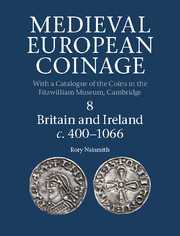Book contents
- Frontmatter
- Contents
- List of plates
- List of figures
- List of maps
- List of tables
- Preface
- Note on spelling
- List of abbreviations
- 1 Introduction
- 2 From Roman Britain To Anglo-Saxon England
- 3 Early Anglo-Saxon Gold Coinage
- 4 The Early Silver Pennies
- 5 The Kingdom Of Northumbria
- 6 The ‘Mercian Supremacy’ In The Age Of Offa And Coenwulf
- 7 The Rise Of Wessex In Southern England
- 8 The Reign Of Alfred The Great
- 9 England From Edward The Elder To Edgar's Reform
- 10 The Late Anglo-Saxon Coinage
- 11 The Anglo-Viking Coinages
- 12 Wales And Scotland
- 13 The Isle Of Man And ‘Irish Sea’ Coinages
- 14 Ireland To 1170 (with Andrew Woods)
- APPENDICES
- 1 Mints in Britain and Ireland, c. 600–1066
- 2 Denominations and units of account
- 3 Coin legends and epigraphy
- 4 Glossary of numismatic and other terms
- Bibliography
- CATALOGUE
- Concordances
- Indexes
4 - Glossary of numismatic and other terms
from APPENDICES
Published online by Cambridge University Press: 11 May 2017
- Frontmatter
- Contents
- List of plates
- List of figures
- List of maps
- List of tables
- Preface
- Note on spelling
- List of abbreviations
- 1 Introduction
- 2 From Roman Britain To Anglo-Saxon England
- 3 Early Anglo-Saxon Gold Coinage
- 4 The Early Silver Pennies
- 5 The Kingdom Of Northumbria
- 6 The ‘Mercian Supremacy’ In The Age Of Offa And Coenwulf
- 7 The Rise Of Wessex In Southern England
- 8 The Reign Of Alfred The Great
- 9 England From Edward The Elder To Edgar's Reform
- 10 The Late Anglo-Saxon Coinage
- 11 The Anglo-Viking Coinages
- 12 Wales And Scotland
- 13 The Isle Of Man And ‘Irish Sea’ Coinages
- 14 Ireland To 1170 (with Andrew Woods)
- APPENDICES
- 1 Mints in Britain and Ireland, c. 600–1066
- 2 Denominations and units of account
- 3 Coin legends and epigraphy
- 4 Glossary of numismatic and other terms
- Bibliography
- CATALOGUE
- Concordances
- Indexes
Summary
The following glossary covers coin names as well as associated weights and units of account used in early medieval Britain and Ireland, along with some technical terminology relating to pertinent numismatic, historical and palaeographical subjects. Unlike the equivalent lists in other MEC volumes (6, 12, 14), it includes relatively few coin names: official and colloquial names for coins or coin types from the early Middle Ages are recorded only exceptionally, and those which do survive are difficult to correlate with specific issues. Some terms (such as the mancus, mark and ora) originated elsewhere in Europe. In Latin sources from England and its neighbours, denarius and nummus are overwhelmingly predominant for the regular silver coinage of the period. The evidence for contemporary monetary terminology is discussed in detail in Appendix 2, pp. 360–71, which also surveys earlier literature on the subject. General numismatic handbooks expand on the definitions and background given here (e.g. Grierson 1975); specific Anglo-Saxon historical terminology is now best approached through the entries and references in WBEASE. Bischoff 1990 provides a survey of medieval palaeography including the scripts touched on here.
Alba. A term first used by Irish writers to describe all of Britain, but which in the years around 900 started to be applied to a kingdom covering much of modern Scotland north of the Forth. For further discussion see Chapter 12, section (a), pp. 309–10.
Alloy. (Fr. aloi, from Lat. alligare, ‘to combine’, but later given a false etymology from the Fr. á loi, which implies to make an alloy that conforms to a ‘legal’ standard.) In a numismatic context, alloy can be either a verb, meaning to combine gold or silver with another metal, or a noun, meaning the mixture thus created or (though not normally in a British context) the base metal involved in the operation.
- Type
- Chapter
- Information
- Medieval European Coinage , pp. 380 - 388Publisher: Cambridge University PressPrint publication year: 2017



